Panel Presenters
Panel 1: Women, Gender, and Sexuality in West Africa
10:45 a.m.-12:15 p.m.
Dr. Andrew Apter, Departments of History and Anthropology, UCLA
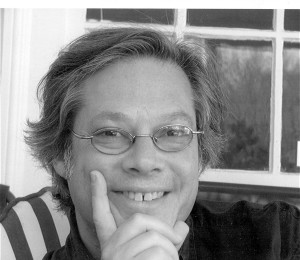
Andrew Apter is Professor of History and Anthropology at UCLA, where he directed the James S. Coleman African Studies Center, and co-founded the Atlantic History Cluster. His books include Black Critics and Kings: The Hermeneutics of Power in Yoruba Society (1992); The Pan-African Nation: Oil and the Spectacle of Culture in Nigeria (2005); and Beyond Words: Discourse and Critical Agency in Africa (2007). He also co-edited Activating the Past: History and Memory in the Black Atlantic World (2010) with Lauren Derby, and recently completed Oduduwa’s Chain: Locations of Culture in the Yoruba-Atlantic.
Dr. Rudolf P. Gaudio, Purchase College, State University of New York
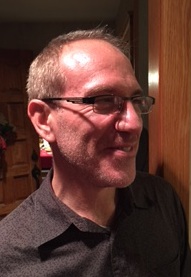
Rudolf P. Gaudio teaches anthropology and media studies at Purchase College, State University of New York, and was recently a Fulbright research scholar at the FCT College of Education, Zuba, Nigeria. He is the author of Allah Made Us: Sexual Outlaws in an Islamic African City. While continuing to write about gender and sexuality, his current research focuses on the national and racial aspirations encoded in Nigeria’s planned modernist capital, Abuja.
Dr. Judith A. Byfield, Department of History, Cornell University
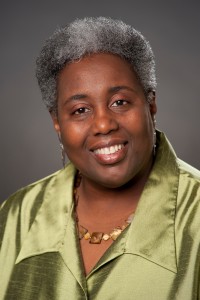
Judith A. Byfield is Associate Professor of History at Cornell University where she teaches African and Caribbean History. She is the author of The Bluest Hands: A Social and Economic History of Women Indigo Dyers in Western Nigeria 1890-1940 (Heinemann, 2002) and recently co-edited with Carolyn Brown, Timothy Parsons, Ahmad Sikainga, Africa and World War II (Cambridge, 2015). A former President of the African Studies Association (2011), Byfield has received numerous fellowships including: Institute for Advanced Study, National Humanities Center, National Endowment of the Humanities, Fulbright Senior Scholar, Rockefeller Humanities Fellowship – University of Michigan, and Andrew Mellon Fellowship – Dartmouth College.
Dr. Emily Lynn Osborn, Department of History, University of Chicago
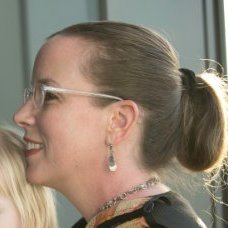
Emily Lynn Osborn is an Associate Professor of History at the University of Chicago. Her first monograph, Our New Husbands Are Here: Households, Gender, and Politics in a West African State from the Slave Trade to Colonial Rule (Ohio, 2011) is a history of gender and state-craft in Guinea-Conakry. She is currently working on a book on technology transfer and diffusion in West Africa that focuses on artisans who work with aluminum; she has also published articles on colonial intermediaries, the history of containerization in West Africa, and the role of the color red in the slave trade.
Panel 2: History, Health, Security and Contemporary Media in West Africa
1: 45 p.m.-3:15 p.m.
Dr. Alhaji U. N’jai, University of Wisconsin-Madison & University of Sierra Leone
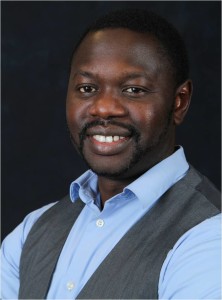
Dr. Alhaji U. N’jai is the founder of Project1808, Inc., a US 501(c)(3) and UN DPI Associated Nonprofit organization. Dr. N’jai co-leads a multinational team of researchers from the University of Wisconsin-Madison, the University of Sierra Leone, and University of Tokyo. These efforts have led to the set-up of functional lab systems, long-term research programs, drug/vaccine development, and social mobilization programs. He holds appointments as a research fellow in the Department of Pathobiological Sciences at the University of Wisconsin-Madison, research and development senior scientist at Procter & Gamble, Cincinnati, Ohio, and adjunct professor of biological sciences, University of Sierra Leone.
Dr. Donna A. Patterson, Department of History, Delaware State University

Donna A. Patterson, Ph.D. is Associate Professor of History and Director of Africana Studies at Delaware State University. She is also currently a Carnegie Fellow at New America in Washington, D.C. Professor Patterson is the author of Pharmacy in Senegal: Gender, Healing, and Entrepreneurship and she has published scholarly articles in the Journal of Healthcare for the Poor and Underserved and the Journal of Women’s History, and an article on Ebola in Anthropologie et Sante. She is currently writing a book on transnational drug consumption and distribution.
Dr. Adesoji Adelaja, Department of Agricultural, Food and Resource Economics, Michigan State University
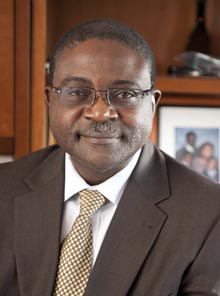
Dr. Adesoji Adelaja.
Soji Adelaja is the John A. Hannah Distinguished Professor in Land Policy at the Department of Agricultural, Food and Resource Economics at Michigan State University (MSU). At MSU, he
founded and directed the Land Policy Institute and Michigan Higher Education Land Policy Consortium (MiHELP) and Co-Directed of the W.K. Kellogg Foundation’s People & Land (PAL) Initiative. He is renowned for his research and policy outreach in such areas as alternative energy policy, agricultural policy, food industry development, public-private partnerships, emerging economic paradigms, the new economy, the green economy, regional growth strategy, asset-based economic development and placemaking. He is the author of over 500 publications, including numerous journal articles. His research has attracted major support from foundations and government. Soji Adelaja recently served as Special Adviser on Economic Intelligence at the Presidency of Nigeria, where he also developed and chaired the Presidential Initiative for the Northeast (PINE) which developed the regional strategic plan for the revitalization of the economy of the Northeast region of Nigeria which was ravaged by Boko-Haram.
Dr. Pita Agbese, Department of Political Science, University of Northern Iowa
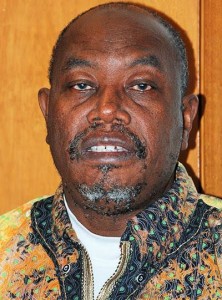
Pita Ogaba Agbese teaches political science at the University of Northern Iowa, Cedar Falls, Iowa. He received his doctorate degree in political science from Northwestern University, Evanston, Illinois. With George Klay Kieh, he co-directed the project, The Military Question in West Africa, which was funded by the Ford Foundation. Agbese and Kieh also directed the project, The State in Africa (equally funded by the Ford Foundation), that has resulted in the publication of four edited volumes, Reconstructing the Authoritarian State in Africa, The State in Africa: Issues and Perspectives, The State in Africa: Beyond False Starts, Reconstituting the State in Africa. Agbese’s latest publication is a book chapter, “Corporate Irresponsibility: The Culpability of Local and Foreign Firms in Corrupt Practices in Nigeria.”
Panel 3: West African Oralities and Oral History
3:30 p.m.-5:00 p.m.
Dr. Gracia Clark, Department of Anthropology, Indiana University-Bloomington
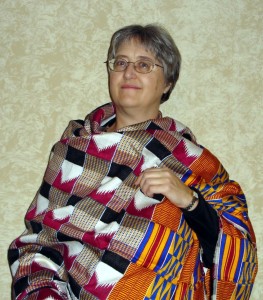
Gracia Clark (PhD Cambridge), Professor Emerita of Anthropology at Indiana University in Bloomington, has studied Kumasi Central Market since 1978. Her books Onions Are My Husband (1994) and African Market Women (2010) join edited volumes and articles on food security, commercial practice, gender, marriage, motherhood, economic history and ethnographic methodology.
Dr. Joe Lunn, Department of Social Science, University of Michigan-Dearborn
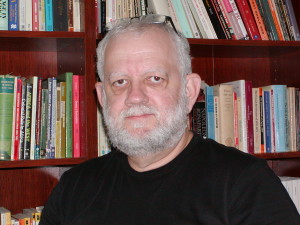 Joe Lunn is Professor of History at the University of Michigan-Dearborn. He received his Ph.D. from the University of Wisconsin-Madison in African and Modern European history and is a specialist in cross-cultural comparative and oral history. A Fulbright Senior Scholar, he is the author of Memoirs of the Maelstrom: A Senegalese Oral History of the First World War, which received the Alf Heggoy Prize of the French Colonial Historical Society. He is presently completing African Voices from the Great War: An Anthology of Senegalese Soldiers’ Life Histories.
Joe Lunn is Professor of History at the University of Michigan-Dearborn. He received his Ph.D. from the University of Wisconsin-Madison in African and Modern European history and is a specialist in cross-cultural comparative and oral history. A Fulbright Senior Scholar, he is the author of Memoirs of the Maelstrom: A Senegalese Oral History of the First World War, which received the Alf Heggoy Prize of the French Colonial Historical Society. He is presently completing African Voices from the Great War: An Anthology of Senegalese Soldiers’ Life Histories.
Dr. Abena P. A. Busia, Department of Women’s and Gender Studies, Rutgers University
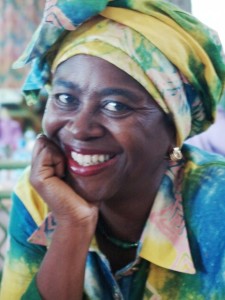
Professor Abena P.A. Busia, Chair, Department of Women’s and Gender Studies, Rutgers University, was co-director/editor of the groundbreaking twenty-year Women Writing Africa Project, a multi-volume anthology designed to recognize the history and cultural legacy of African women around the continent. Busia is also co-editor of Theorizing Black Feminisms (1993) and Beyond Survival (1999) and has authored numerous articles and book chapters on topics including black feminism, colonial discourse and African Diaspora Literature. A celebrated poet who has read in venues around the world she is the author of two collections, Testimonies of Exile (1990) and Traces of a Life (2008).
Dr. Stephan Miescher, Department of History, University of California, Santa Barbara
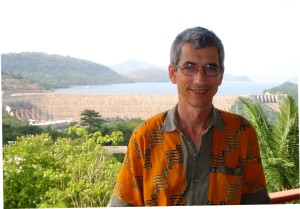
Stephan F. Miescher is an Associate Professor of History at the University of California, Santa Barbara. He is the author of Making Men in Ghana and co-editor of six edited collections, among them African Words and Voices: Critical Practices in Oral History, with Luise White and David William Cohen, Modernization as Spectacle in Africa, with Peter J. Bloom and Takyiwaa Manuh, and Gender, Imperialism, and Global Exchanges, with Michele Mitchell and Naoko Shibusawa. He is completing the monograph, A Dam for Africa: The Volta River Project and Modernization in Ghana, and is producing the film, “Ghana’s Electric Dreams” (dir. R. Lane Clark).
Panel 4: West African and Diasporic Religions
11:15 a.m.-12:45 p.m.
Dr. Robert Baum, African and African American Studies, Dartmouth College
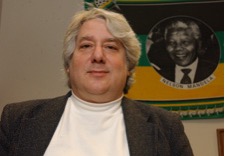 Robert Baum is an Associate Professor of African and African-American Studies at Dartmouth College. He is also affiliated with the Program in Women, Gender, and Sexuality Studies. He is the author of two books: SHRINES OF THE SLAVE TRADE: DIOLA RELIGION AND SOCIETY IN PRE-COLONIAL SENEGAMBIA (Oxford, 1999) and WEST AFRICA’S WOMEN OF GOD: ALINESITOUE AND THE DIOLA PROPHETIC TRADITION (Indiana, 2015). SHRINES won a prize from the American Academy of Religion for the best first book in the History of Religions. He is the author of many articles in and serves as Executive Editor of the JOURNAL OF RELIGION IN AFRICA.
Robert Baum is an Associate Professor of African and African-American Studies at Dartmouth College. He is also affiliated with the Program in Women, Gender, and Sexuality Studies. He is the author of two books: SHRINES OF THE SLAVE TRADE: DIOLA RELIGION AND SOCIETY IN PRE-COLONIAL SENEGAMBIA (Oxford, 1999) and WEST AFRICA’S WOMEN OF GOD: ALINESITOUE AND THE DIOLA PROPHETIC TRADITION (Indiana, 2015). SHRINES won a prize from the American Academy of Religion for the best first book in the History of Religions. He is the author of many articles in and serves as Executive Editor of the JOURNAL OF RELIGION IN AFRICA.
Dr. Edward Curtis, Department of Religious Studies, Indiana University-Purdue University Indianapolis
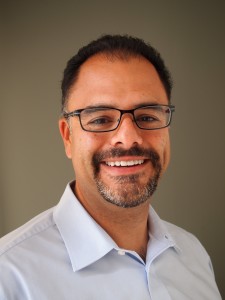
Edward E. Curtis IV is founding coeditor of the Journal of Africana Religions and co-editor of the Africana Religions book series at Pennsylvania State University Press. The author or editor of eight books on Islam in the United States and the African Diaspora, Curtis’s research has been funded by Carnegie, Fulbright, NEH, and Mellon fellowships. He is Millennium Chair of the Liberal Arts and Professor of Religious Studies at the Indiana University School of Liberal Arts in Indianapolis, Indiana.
Dr. Cheikh Babou, Department of History, University of Pennsylvania

Cheikh Anta Babou is a Professor of History at the University of Pennsylvania in Philadelphia. Dr. Babou teaches African History and the History of Islam in Africa. His research focuses on mystical Islam in West Africa and Senegal and on the history of West African Muslim immigrants in Europe and North America. His book, Fighting the Greater Jihad: Amadu Bamba and the Founding of the Muridiyya of Senegal, 1853-1913 was published by Ohio University Press in 2007. A French translation was released by Karthala in 2011.
Dr. Shobana Shankar, Department of History, Stony Brook University
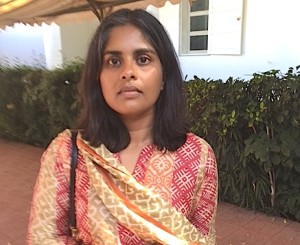
Shobana Shankar is the author of Who Shall Enter Paradise? Christian Origins in Muslim Northern Nigeria, c. 1890-1975 (Ohio University Press, 2014) and co-editor of Religions on the Move! New Dynamics of Religious Expansion in a Globalizing World (Brill, 2013). She has also published journal articles and book chapters on missionary medicine, civil society and religion in Africa, and gender and generational dynamics in Northern Nigeria. Her next book project examines how religious and cultural missions shaped India’s developing relations with West African countries from the era of decolonization. She teaches in the History Department at Stony Brook University (SUNY).
Panel 5: West African Narratives of Slavery and the Slave Trades
2:15 p.m.-3:45 p.m.
Dr. Trevor Getz, Department of History, San Francisco State University
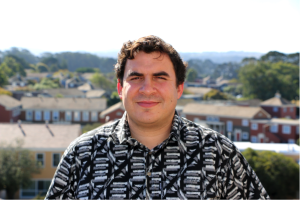
Dr. Trevor R. Getz is Professor of African History at San Francisco State University. He is the author or co-author of nine books including Abina and the Important Men, which won the James Harvey Robinson prize. He edits the Oxford University Press African World Histories series and is currently working on a primer for teaching African History for Duke University Press as well as co-editing a collected work on slavery and emancipation in Ghana with Rebecca Shumway for Bloomsbury Press.
Dr. Ugo Nwokeji, African American Studies & African Diaspora Studies, UC Berkeley
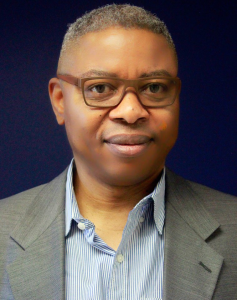
Ugo Nwokeji is the Director of the Center for African Studies at the University of California, Berkeley, where he is also Associate Professor of African American Studies. His work deals with the cultural history and political economy of Africa since 1500, with particular focus on international commerce in the Bight of Biafra. His publications include The Nigerian National Petroleum Corporation and the Development of the Oil and Gas Industry (Baker Institute for Public Policy, 2007) and The Slave Trade and Culture in the Bight of Biafra (CUP, 2010). The latter won the 2011 Herskovits Book Prize.
Dr. Olatunji Ojo, Department of History, Brock University
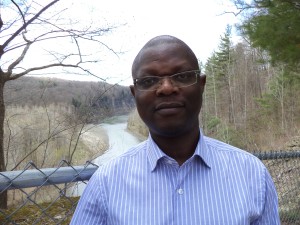 Olatunji Ojo teaches African History at Brock University, St Catharines, Ontario. He is a Fellow of the Harriet Tubman Institute, York University, Toronto and the African Origins Name Database Project at Emory University, Atlanta. His recent publication include an edited volume (with Nadine Hunt) Slavery in Africa and the Caribbean: A History of Enslavement and Identity Since the 18th Century (London: I. B. Tauris, 2012) and essays on Africa and the African Diapora which have appeared in various journals.
Olatunji Ojo teaches African History at Brock University, St Catharines, Ontario. He is a Fellow of the Harriet Tubman Institute, York University, Toronto and the African Origins Name Database Project at Emory University, Atlanta. His recent publication include an edited volume (with Nadine Hunt) Slavery in Africa and the Caribbean: A History of Enslavement and Identity Since the 18th Century (London: I. B. Tauris, 2012) and essays on Africa and the African Diapora which have appeared in various journals.
Panel 6: Traditional Archives and New Media
4:00 p.m.-5:30 p.m.
Dr. Deborah Mack, National African American Museum of History and Culture, Smithsonian Institution
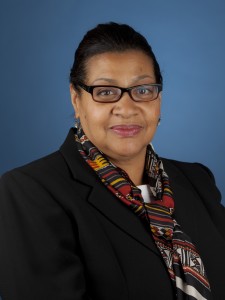
Deborah Lynn Mack, Associate Director of Constituent and Community NMAAHC – National Museum of African American History & Culture
Deborah L. Mack is the Associate Director for Community and Constituent Services at the National African American Museum of History and Culture, Smithsonian Institution. She serves as the principal executive responsible for strategic partnerships and international activities. Mack is an active service member of the Association of African American Museums, International Council of African Museums, Southeast Museums Conference, the editorial board of the Journal of Public History, and a peer reviewer for NEH, NEA and IMLS. She holds a Ph.D. and an M.A., both in anthropology from Northwestern University, and a B.A. in geography from the University of Chicago.
Dr. Diana Baird N’Diaye, Smithsonian Center for Folklife and Cultural Heritage

Diana Baird N’Diaye leads The Will to Adorn: African American Dress and the Aesthetics of Identity, a pan-institutional Smithsonian, multi-sited research project. Her training in anthropology and experience as a studio craft artist support over thirty years of fieldwork, exhibitions, programs, and publications focusing on expressive culture in Africa and her diasporas. She is a research associate at Michigan State University and she holds a Ph.D. in anthropology and visual studies from The Union Institute. She is co-editor of a volume of essays entitled, Curatorial Conversations and author of a forthcoming book on the Will to Adorn both for University of Mississippi Press.
Mr. Jeff Ajueshi, Thought Pyramid Art Centre, Abuja, Nigeria
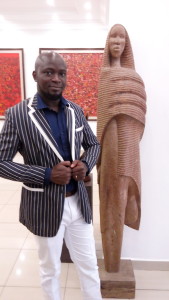
Jeff Ometite Ajueshi is a curator and gallerist. In 2007, he founded Thought Pyramid Art Centre in heart of Abuja, Nigeria. He has facilitated curating over 60 exhibitions. The most recent exhibition featured art masters, including Ben Enwonwu, Ben Osawe, Bruce Onobrakpeya, Okpu Eze, David Dale, Erhabor Emokpae, Jimoh Buraimoh, Muraina Oyelami, Rufus Ogundele, Twins 77, Bisi Fakeye and Kolade Oshinowo, just to mention a few. In his commitment to art in Nigeria, Ajueshi established Foundation for Arts and Creative Training (FACT), a residency programme in Delta State in Nigeria. Ajueshi is married, and has two sons and a daughter.
Dr. Nii O. Quarcoopome, Detroit Institute of Arts
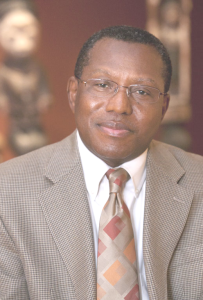
Quarcoopome received his doctorate in art history from the University of California, Los Angeles, in 1993. He joined the Detroit Institute of Arts in 2002 as curator of African Art and department head of Africa, Oceania and Indigenous Americas and is currently Co-Chief Curator. He received the National Endowment of the Arts and National Endowment of the Humanities Implementation Grants for his 2010 groundbreaking exhibition “Through African Eyes: The European in African Art, 1500-Present”, which was awarded the American Association of Museums’ highest honor for overall excellence and a Detroit City Council Resolution. He is the first in American museum history to hold a shared curatorship in two museums.

